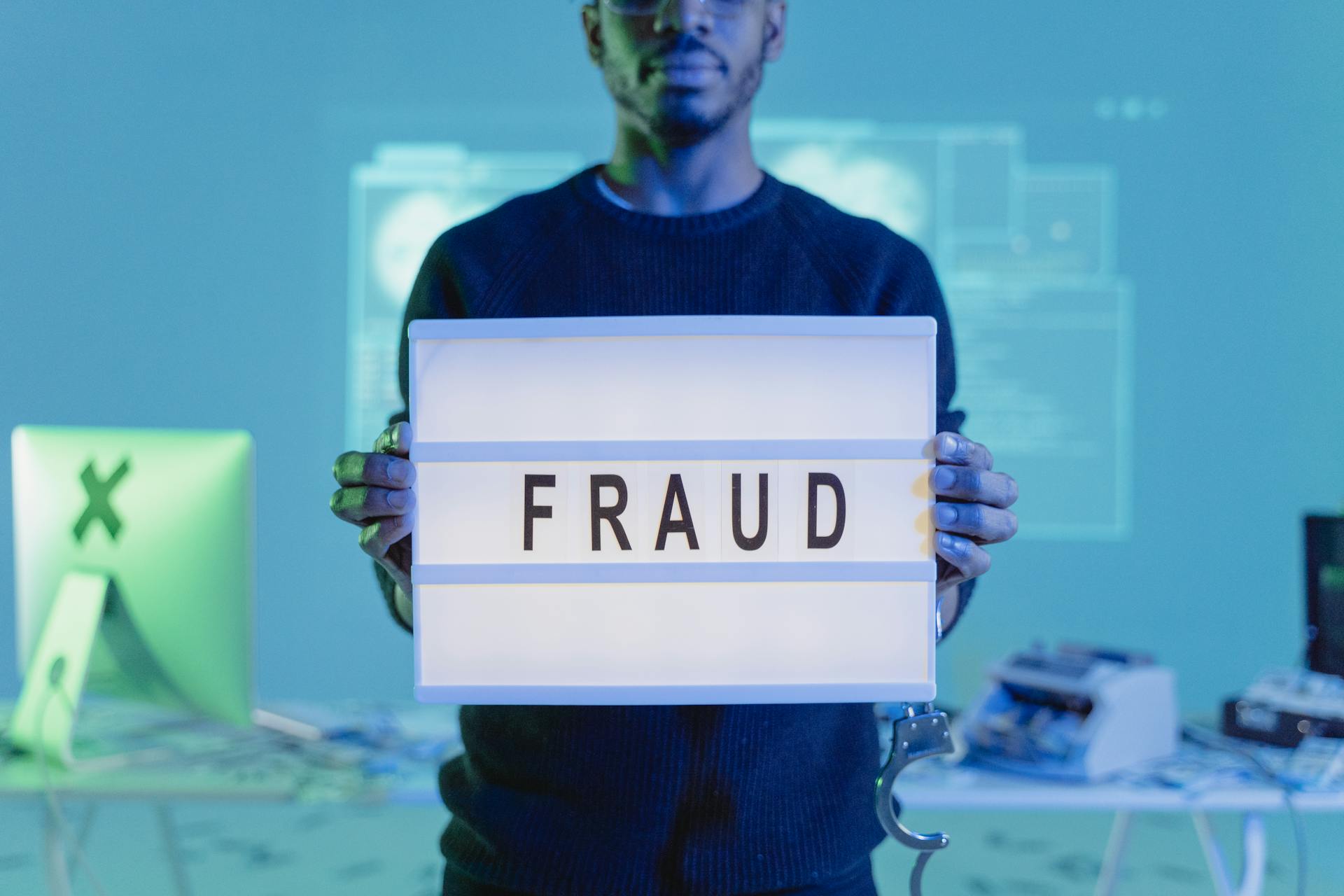
Reporting mortgage fraud is a serious issue that affects not only individuals but also the entire housing market. According to the Federal Bureau of Investigation (FBI), mortgage fraud costs the US economy billions of dollars each year.
It's essential to know the signs of mortgage fraud to prevent it from happening in the first place. Look out for suspicious activity, such as multiple loan applications being submitted by the same borrower.
Mortgage fraud can take many forms, including false income or employment information, property appraisals, and loan applications. In fact, the FBI reports that property appraisals are one of the most common types of mortgage fraud.
Recommended read: Housing Loan Fraud
Why Someone Commits Mortgage Fraud
Mortgage fraud is a serious issue that can have severe consequences for individuals and the entire financial system. People commit mortgage fraud for various reasons, often driven by the potential for financial gain or the desire to buy a home they can't afford.
Related reading: Financial Audit Report
Some common reasons someone might commit mortgage fraud include boosting their mortgage approval odds, securing a larger home loan, or getting a lower mortgage rate. These motivations can be tempting, but they come with significant risks.
Borrowers may commit fraud for housing, misrepresenting or omitting details about employment and income, debt and credit, or property value and condition to obtain or maintain real estate ownership. This type of fraud can be committed with the assistance of loan officers or other personnel.
Industry professionals can also commit mortgage fraud for profit, misstating or misrepresenting details about employment and income, debt, and credit, or property value and condition to maximize profits on a loan transaction. This can be done by any professional in the loan transaction chain, including builders, real estate sales agents, and loan officers.
Fraud for profit can be committed by working in concert as a network, defrauding underwriters, lenders, and borrowers, and maximizing fees and share profits on all mortgage-related services. This can be motivated by the desire to gain extra sales commissions or increase an investment position.
A unique perspective: Bad Credit Mortgage Refin
Types of Mortgage Fraud Schemes
Mortgage fraud schemes can be complex and sneaky, but knowing the signs can help you protect yourself and others. Straw buyer schemes are a type of mortgage fraud where someone buys a property on behalf of another person to keep their identity hidden.
The straw buyer may have good credit, making it easier to secure a mortgage for the actual buyer, who may have bad credit. This can be a red flag, as the straw buyer's income, savings, and credit may be inconsistent with their overall profile.
An entity other than the borrower making the mortgage payments, the buyer not intending to occupy the home, and the buyer not being represented by a real estate agent are all characteristics that can signal the use of straw buyers.
Property flipping is another type of mortgage fraud, often committed by a house flipper and an appraiser who conspire to artificially inflate the property's value. This can happen when a property is bought below market and immediately sold at a profit with the help of a corrupt appraiser.
You might enjoy: Commercial Property Mortgages
Occupancy fraud occurs when a borrower claims the home will be owner-occupied to obtain favorable bank status when the property will actually remain vacant. This can be done by using someone else's identity, credit score, and income to obtain property for another buyer who may not qualify for a mortgage.
Identity theft is a common individual mortgage fraud scam, where the real buyer fraudulently obtains financing using an unwilling and unaware victim's information. This can include stolen pay stubs, bank records, tax returns, W-2s, and falsified employment verification letters.
Foreclosure rescue and loan modification scams target homeowners experiencing financial hardship, often promising to "save" their home in exchange for a fee.
If this caught your attention, see: What Not to Do When Applying for a Mortgage?
Mortgage Fraud Detection and Investigation
Lenders can detect mortgage fraud by checking loan applications for red flags, such as spelling errors and inconsistencies with the borrower’s income or documents that appear to be altered. Many lenders use fraud detection software, such as CoreLogic’s LoanSafe.
Lenders have a strong motive to root out instances of mortgage fraud since they lose money if a home buyer doesn’t make payments because they only qualified for a loan through misrepresentation of their finances.
Air Loan vs. Appraisal
Air loan and appraisal fraud are two common mortgage scams that can have serious consequences. An air loan is a loan obtained on a nonexistent property or for a nonexistent borrower, where a group of professionals work together to create a fake borrower and chain of title.
This scam can be particularly complex, involving phone banks and mailboxes to create fake employment verifications, home addresses, and borrower telephone numbers. The perpetrators of air loan scams simply put cash into their own hands, with no property ever being bought or sold.
Appraisal fraud, on the other hand, often involves a group of professionals working together to maximize a purchase price and loan amount. This can include corrupt real estate agents, builders, appraisers, and loan officers who conspire to increase their own commissions.
Corrupt appraisers may also undervalue properties to help fellow investors purchase them at inflated prices. Mortgage fraud detection and investigation must be thorough to uncover these complex schemes.
Who Investigates?
The FBI is the main agency that investigates instances of mortgage fraud. You can report mortgage fraud to the FBI by calling 800-CALL-FBI (800-225-5324). The FBI also has an electronic tip form where you can submit a tip. To report mortgage fraud in your area, you can visit an FBI field office.
The FBI has made it easy to report mortgage fraud. You can submit a tip via the FBI's electronic tip form. This form is available online for your convenience.
Detection
Lenders can detect mortgage fraud by checking loan applications for red flags, such as spelling errors or inconsistencies with the borrower's income.
Many lenders use fraud detection software, like CoreLogic's LoanSafe, to help identify potential issues.
Lenders have a strong motive to root out instances of mortgage fraud since they lose money if a home buyer doesn't make payments because they only qualified for a loan through misrepresentation of their finances.
They look out for signs of possible fraudulent activity, such as unrealistically high income for the borrower's stated job.
Fraud detection software tools also help lenders spot mortgage fraud by cross-checking the information you submit with other available sources.
Lenders may also analyze documents to see if there is evidence they've been doctored or modified.
Mortgage fraud can be detected long after a loan application is approved, such as when a borrower misses payments.
Lenders are likely to be the ones to detect fraud by mortgage borrowers trying to gain access to housing.
Related reading: Lenders Commercial Mortgage
Mortgage Fraud Prevention and Combating
Mortgage fraud is a serious issue that can have devastating consequences for individuals and communities. States have taken a big step recently by requiring loan officer licensing and continuing education.
Professional organizations such as the Mortgage Bankers Associations (MBA) and National Association of Mortgage Brokers (NAMB) have a code of conduct and best practices that are peer-monitored. This helps to maintain high standards in the industry.
Industry professionals must pursue higher personal standards and submit to peer organization accountability. The FBI's white-collar crime program also monitors complaints and suspicious activity in the mortgage industry.
Is a Felony?
Mortgage fraud is typically charged as a felony. The amount involved determines the severity of the charge, with amounts below $1,000 potentially charged as a misdemeanor.
If you're involved in mortgage fraud, you could be looking at serious consequences, including a felony charge. This can have long-lasting effects on your life, including damage to your reputation and potential loss of freedom.
The amount involved in the fraud is a key factor in determining the severity of the charge. If the amount is below $1,000, the charge may be reduced to a misdemeanor.
Silent Seconds
Silent seconds are a type of mortgage fraud where the buyer gets a second loan to pay for the down payment, but doesn't disclose it to the lender.
This type of fraud works by making it seem like the borrower invested their own money in the down payment, when in reality, it's a separate loan that's not being disclosed.
See what others are reading: Upside down Mortgage
Combating Mortgage Fraud
Combating mortgage fraud requires a multi-faceted approach. States have taken a big step by requiring loan officer licensing and continuing education.
Professional organizations like the Mortgage Bankers Associations (MBA) and National Association of Mortgage Brokers (NAMB) have a code of conduct and best practices that are peer-monitored. This helps to ensure that industry professionals are held to high standards.
The FBI's white-collar crime program monitors complaints and suspicious activity in the mortgage industry. This helps to identify and prevent mortgage fraud.
Government agencies license and monitor real estate, title, and insurance agencies. This helps to prevent fraudulent activities in these industries.
Many states require periodic auditing of mortgage-lending companies' activities and transactions. This helps to monitor compliance with laws and regulations.
Here are some organizations that are working to prevent mortgage fraud:
- CoreLogic
- Federal Housing Finance Agency
- Federal Bureau of Investigation
- Mortgage Professional America
- FannieMae
- Rocket Mortgage
- The White House
- Mortgage Bankers Association
- National Association of Mortgage Brokers
- FBI
Frequently Asked Questions
What is the reward for reporting mortgage fraud?
A whistleblower reporting mortgage fraud may receive a reward of up to 30% of the recovered funds. This reward can be substantial, making it a significant incentive for those who come forward with credible allegations.
How long does a mortgage fraud investigation take?
Mortgage fraud investigations can take several months to several years to complete, depending on the complexity of the case. The length of time can vary significantly, so it's best to contact the investigator for a more accurate estimate.
Featured Images: pexels.com


